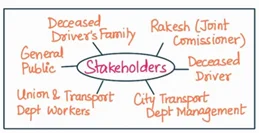Answer:
| Approach:
Introduction
Body
- Options available to Rakesh to meet the situation
- Critical examination of each option
- Ethical dilemmas faced by Rakesh
- Course of action Rakesh may adopt to diffuse the situation
Conclusion
|
Introduction:
The case presents a complex situation involving the death of a bus driver during an altercation, leading to a strike by the drivers’ union and a standoff between the union, the deceased driver’s family, and the City Transport Department management. Rakesh, as the Joint Commissioner, is faced with the task of resolving the situation. The analysis will focus on the stakeholders involved and their interests.

Body:
(a) Options available to Rakesh to meet the situation:
- Approve the union’s demands and provide full extra compensation to the deceased driver’s family, along with employment for one family member.
- Reject the union’s demands and maintain the current policy of compensation for drivers who died on duty.
- Initiate a dialogue with the union and the deceased driver’s family to understand their concerns and explore possible solutions.
- Seek legal advice to determine the appropriate course of action in line with the law and department policies.
(b) Critical examination of each option:
- Approve the union’s demands and provide full extra compensation to the deceased driver’s family, along with employment for one family member.
Positives:
- Demonstrates empathy and support towards the deceased driver’s family.
- Likely to appease the union and end the strike.
- Maintains a positive public image for the City Transport Department.
Negatives:
- Sets a precedent for similar demands from other drivers or unions.
- May strain the department’s financial resources.
- Could create dissatisfaction among other employees who may feel their demands are not being met equally.
- Reject the union’s demands and maintain the current policy of compensation for drivers who died on duty.
Positives:
- Upholds consistency in compensation policies.
- Demonstrates adherence to established rules and regulations.
- Avoids potential strain on the department’s finances.
Negatives
- Escalates the strike and leads to prolonged unrest among the transport department workers.
- May damage the department’s public image and reputation.
- Increases the likelihood of further disputes and conflicts with the union.
- Initiate a dialogue with the union and the deceased driver’s family to understand their concerns and explore possible solutions.
Positives:
- Demonstrates a willingness to listen and understand the grievances of the union and the family.
- Provides an opportunity to find a mutually agreeable solution.
- Promotes transparency and open communication.
Negatives:
- Dialogue may take time and may not immediately resolve the situation.
- Requires careful negotiation and compromise from both parties.
- There is no guarantee of reaching a satisfactory resolution for all parties involved.
- Seek legal advice to determine the appropriate course of action in line with the law and department policies.
Positives:
- Ensures compliance with legal obligations and regulations.
- Provides a clear framework for decision-making.
- Reduces the risk of potential legal disputes in the future.
Negatives:
- Legal advice may limit the flexibility of decision-making.
- May not address the emotional and social aspects of the situation.
- Could be perceived as an overly bureaucratic approach that lacks empathy.
(c) Ethical dilemmas faced by Rakesh:
- Balancing the financial constraints of the department with the needs and expectations of the deceased driver’s family.
- Addressing the potential discrimination concerns raised by the union and ensuring fairness in compensation policies.
- Maintaining the integrity and reputation of the City Transport Department while making a decision that impacts the workers’ morale and public perception.
(d) Course of action Rakesh may adopt to diffuse the situation:
- Rakesh should initiate a dialogue with the union and the deceased driver’s family to understand their concerns and grievances.
- He should demonstrate empathy and transparency, explaining the department’s financial limitations and legal obligations.
- Rakesh can explore options for providing a reasonable compensation package within the available resources and consider offering support services to the family.
- Open communication and a collaborative approach may help in diffusing the situation and finding a resolution that considers the interests of all stakeholders.
Conclusion:
Rakesh should adopt a comprehensive approach that includes reviewing the compensation policy, engaging in dialogue with the union, seeking legal advice, conducting an internal investigation, and exploring alternative forms of support to diffuse the situation and address the ethical dilemmas at hand.
